#emr vs ehr
Explore tagged Tumblr posts
Text
0 notes
Text
EMR vs EHR: What is the difference?
There are plenty of acronyms that are in use inside the healthcare industry. EHR and EMR are two standard terms that can be used alternatively. When it comes to a debate on EMR vs EHR, both are pretty similar; however, they have different meanings. Furthermore, EMR is an acronym for ‘Electronic Medical Records,’ while EHR is an acronym for ‘Electronic Health Records’. EHRs have a deeper and broader scope in comparison to an EMR.

0 notes
Text
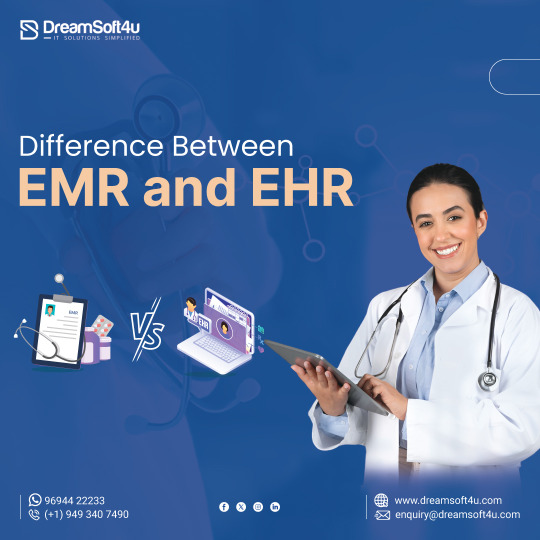
The healthcare industry has adopted technology widely and taken steps towards digital transformation. However, in order to make a complete digital shift, healthcare needs to streamline their data management. Although healthcare is one of the biggest sectors with huge amounts of data. It has to be secured and easily accessible. This is where two technological advancements, i.e., EMR vs EHR, play major roles.
#ehr software#emr software#emr system#emr vs ehr#ehr integration#benefits of ehr#emr integration#ehr benefits#benefits of emr#emr benefits
0 notes
Text
Cracking the Code: EMR vs EHR - Everything You Need to Know for Efficient Patient Data Management
In the healthcare industry, the terms EMR (Electronic Medical Records) and EHR (Electronic Health Records) are often used interchangeably, leading to confusion. However, understanding the distinction between the two is crucial for healthcare professionals and patients alike. This post aims to provide a comprehensive overview of the differences EMR vs EHR, their respective functionalities, and their impact on healthcare delivery.
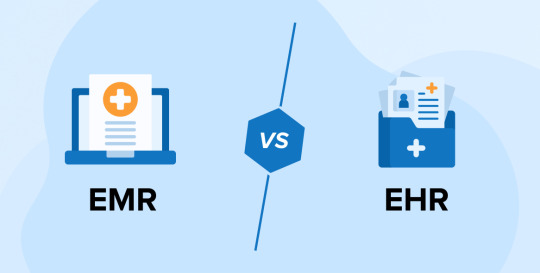
What is EMR and its key features?
EMR, or Electronic Medical Records, refers to digital versions of paper charts in a clinician's office. They contain the medical and treatment history of patients in one practice. EMRs typically include medical and treatment history, diagnoses, medications, treatment plans, immunization dates, allergies, radiology images, and laboratory test results.
What are the key features of EHR?
EHRs, or Electronic Health Records, are designed to be shared across different healthcare settings, enabling a more comprehensive view of a patient's medical history. EHRs go beyond the data collected in the provider’s office and include a more comprehensive patient history. They can be created, managed, and consulted by authorized providers and staff from across more than one healthcare organization.
How do EMR and EHR differ in terms of interoperability?
Interoperability is a critical factor in the differentiation between EMR and EHR. EMRs are not designed to be shared outside the individual practice. EHRs, on the other hand, are built to be shared with other healthcare providers, such as laboratories, specialists, medical imaging facilities, pharmacies, emergency facilities, and school and workplace clinics, so they contain information from all clinicians involved in a patient's care.
What role do EMR and EHR play in patient engagement?
Understanding the role of EMR and EHR in patient engagement is essential for healthcare professionals and patients. EMR, or Electronic Medical Records, serve as digital versions of paper charts within a clinician's office, containing a patient's medical and treatment history in one practice. On the other hand, EHRs, or Electronic Health Records, are designed to be shared across different healthcare settings, providing a more comprehensive view of a patient's medical history. This interoperability allows for a more holistic approach to patient care, enabling authorized providers and staff from multiple healthcare organizations to access and contribute to a patient's records, ultimately enhancing patient engagement and healthcare delivery.
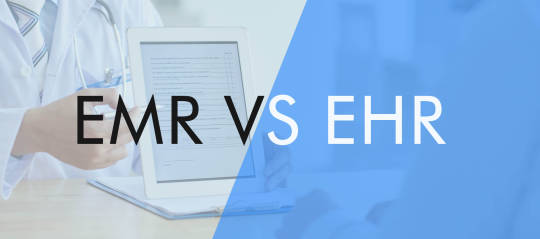
What are the key benefits of using EMR and EHR?
The key benefits of using EMR and EHR is essential for healthcare professionals seeking to optimize patient care and streamline administrative processes. EMRs, or Electronic Medical Records, offer the advantage of centralizing a patient's medical and treatment history within a single practice, facilitating efficient access to crucial information for clinicians. On the other hand, EHRs, or Electronic Health Records, enable comprehensive data sharing across diverse healthcare settings, fostering a more holistic approach to patient care and enhancing collaboration among authorized providers. By leveraging the functionalities of EMR and EHR, healthcare organizations can improve patient engagement, clinical decision-making, and overall healthcare delivery.
Conclusion
While EMR and EHR are both digital systems for managing patient health information, their distinct functionalities and interoperability capabilities set them apart. Understanding the differences between EMR vs EHR is essential for healthcare professionals and patients to fully harness the benefits of digital health records in providing high-quality, coordinated care.
0 notes
Text
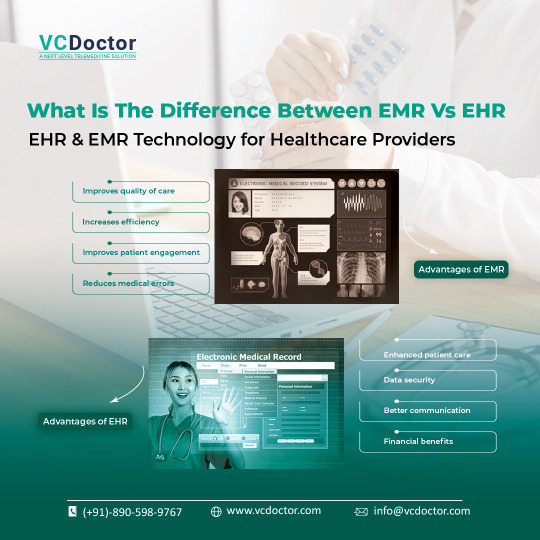
The healthcare industry has experienced a revolution in recent years, especially after the covid-19. Since the healthcare industry is digitalized, Telemedicine software and health records are essential tools for doctors and health specialists. The global electronic health records market is expected to reach a valuation of over $40 billion by the end of 2024. At times, the terms “EHR and EMR” are used interchangeably. However, both are different from one another. Understanding the difference between EHR and EMR is vital for patients, healthcare providers, and specialists. If you’re eager to know how EMR vs EHR, you’ve landed on the right page.
0 notes
Text
Industry-Specific Best ERP Solutions in Dubai: Which One Fits Your Business?

Enterprise Resource Planning (ERP) solutions have become a necessity for businesses in Dubai, helping them streamline operations, enhance productivity, and ensure compliance with local regulations. However, not all ERP systems are created equal. Different industries require tailored solutions to meet their unique challenges and operational needs. In this blog, we explore the best industry-specific ERP solutions in Dubai and help you determine which one fits your business.
1. Retail Industry: POS-Integrated ERP Solutions
For retail businesses, an ERP system must offer seamless inventory management, customer relationship management (CRM), and point-of-sale (POS) integration. The best ERP solutions for retail in Dubai include:
SAP Business One: Offers real-time inventory tracking, multi-store management, and customer analytics.
Odoo ERP: Provides customizable modules for e-commerce, POS, and sales management.
Microsoft Dynamics 365: Ideal for omnichannel retail operations with AI-powered insights.
Key Features:
✔️ Real-time inventory tracking ✔️ POS system integration ✔️ Customer analytics and loyalty program management
2. Manufacturing Industry: ERP with Production Planning
Manufacturers in Dubai require ERP solutions that can handle production scheduling, supply chain management, and quality control. Top ERP solutions include:
SAP S/4HANA: Offers predictive analytics and automation for production processes.
Oracle NetSuite: Features end-to-end production management and financial reporting.
Infor CloudSuite Industrial: Tailored for discrete and process manufacturing businesses.
Key Features:
✔️ Bill of materials (BOM) management ✔️ Production planning and scheduling ✔️ Real-time supply chain visibility
3. Construction Industry: Project-Based ERP Solutions
With Dubai's booming construction sector, ERP solutions must include project costing, contract management, and compliance tracking. The best choices are:
Aconex by Oracle: Ideal for large-scale construction projects with document control and project collaboration features.
Epicor ERP: Offers financial and project cost tracking tailored for construction firms.
Microsoft Dynamics 365 for Construction: Provides end-to-end project lifecycle management.
Key Features:
✔️ Project budgeting and cost control ✔️ Contract and compliance management ✔️ Resource allocation and scheduling
4. Healthcare Industry: ERP with Compliance & Patient Management
The healthcare sector in Dubai requires ERP systems that ensure regulatory compliance and facilitate seamless patient care. Top ERP solutions include:
SAP for Healthcare: Offers patient management and regulatory compliance tools.
Meditech ERP: Specializes in electronic health records (EHR) and hospital management.
Microsoft Dynamics 365 Healthcare: Provides integrated financial and operational workflows for healthcare providers.
Key Features:
✔️ Electronic medical records (EMR) integration ✔️ Regulatory compliance with DHA and MOH standards ✔️ Patient and billing management
5. Logistics & Distribution: ERP for Supply Chain Optimization
Logistics and distribution companies in Dubai need ERP solutions with strong warehouse and transportation management capabilities. The best solutions include:
SAP SCM: A comprehensive supply chain management solution for large enterprises.
Oracle Transportation Management (OTM): Specializes in freight and logistics optimization.
Tally ERP 9: A cost-effective solution for small and mid-sized logistics firms.
Key Features:
✔️ Warehouse and inventory management ✔️ Route optimization and fleet tracking ✔️ Automated invoicing and supplier management
Choosing the Right ERP for Your Business
When selecting an ERP solution in Dubai, consider the following factors:
Industry-Specific Features: Ensure the ERP aligns with your operational needs.
Scalability: Choose a solution that grows with your business.
Cloud vs. On-Premise: Cloud-based ERPs offer flexibility, while on-premise solutions provide greater control.
Local Compliance: Verify that the ERP meets UAE regulations such as VAT compliance.
Conclusion
Investing in an industry-specific ERP solution in Dubai can significantly improve operational efficiency and business growth. Whether you're in retail, manufacturing, construction, healthcare, or logistics, choosing the right ERP system tailored to your industry will maximize your return on investment.
Need help selecting the Best ERP Dubai for your business in Dubai? Contact an ERP consultant today and take the first step toward digital transformation!
0 notes
Text
Cloud-Based vs. On-Premises EHR EMR Systems: Pros and Cons
Overview
The use of EHR EMR software is crucial in the advancement of clinic operations in this fast-paced age of clnic practice. A cloud or on-premises solution, whichever you choose for your practice, the appropriate system can enhance the management of patient information, appointments, prescriptions, and communication. Understanding the benefits and drawbacks of each deployment model is immensely helpful as clinic management software continues to evolve, especially in making optimal decisions in line with each clinic’s specific needs.
Cloud-Based EHR EMR Systems: The Benefits
Cloud-based EHR EMR software is increasingly gaining popularity, especially in modern healthcare facilities. This solution is hosted at a remote location, usually by a third party, which has several benefits:
User-Friendly and Convenience: Cloud-based systems provide a great advantage in that clnic use can retrieve patient records at any place and any time. This becomes more beneficial when managing the clinic with out-of-single-location operations, whether it’s a single practice or many-station facilities.
Cost Effectiveness: The cost of using cloud-based EHR EMR software has been one of the advantages to marketing, thus drawing many clinics to the use of the software. The clinics do not need numerous and costly pieces of hardware. Also, there is no need to hassle with the maintenance of the applications, as you are timely with the latest versions of the applications. The cloud service provider does that, therefore lessening the first installation expenses and cutting down the continuous servicing and support costs.
Adaptability: As your clinic expands, so does the cloud-based option. For instance, on-premise systems have their limitations and may require very costly hardware replacements. Such interruptions are not common with cloud services. It does not matter whether you’re adding more people to the system or opening up your services in different geographical locations. It is all smooth.
Risk Management and Data Protection: When it comes to the risks and safety of the data of individuals, cloud vendors tend to utilize considerable resources in strategies of preventing any data breaches. Many providers will also offer ways to be shielded from acts such as HIPAA and keep the records of the respective clinic intact and compliant to the rules of the market.
Challenges of Cloud-Based EHR EMR Systems
Even with their merits, cloud-based systems have their own challenges:
Reliance on the Internet: Cloud-oriented systems operate on a network; hence, in case of failure to access the internet, the patient information will not be available.
Public Cloud Risks: Despite the reassurance of cloud hosting providers, some networked clinics are reluctant to utilize cloud services as they fear unauthorized access to critical data.
Continuous Maintenance Costs: In as much as a subscription-based system has numerous advantages at the beginning, the running costs of the cloud-based clinic management system may be high.
On-Premises EHR EMR Systems: The Benefits
Alternatively, there are practices that prefer EHR EMR systems that are installed on the premises. This is the case since the software is purchased and installed on the clinic's computer systems, which enables the clinic to have total ownership of the software.
Complete Control: Control is perhaps the greatest advantage provided by on-premises solutions. The IT personnel within the clinic can take charge of the software, monitor the system for any necessary updates, and also reinforce that all patient data remains on the organization’s internal systems.
Security and Privacy: For clinics that may hold especially sensitive patient information or for those that have stringent privacy practices, on-premises EHR EMR software may be the best option. Since the data remains within the facility, the chances of outside access are minimized.
No Internet Dependency: On the other hand, unlike systems that are cloud-based, an on-premise solution is not affected in any way by the availability or lack of an internet connection. This can help keep the smooth functioning of your clinic in case there are areas with poor internet service.
Future Outlook: Which Option is Right for Your Clinic?
As IT in health care improves, both on-premise and cloud-based EHR EMR software will be important in the management of the clinic. Nonetheless, there are indications of progressive growth in the future on an increased focus on cloud technologies, and this is particularly true with the rising trends of telemedicine and practices with multiple geographic locations. There are also cloud solutions that are easier to integrate with other clnic management software, such as one for handling appointment bookings and billing, to form a complete system that enhances the working of your clinic.
Moreover, given the rapid development in AI and ICT technologies, it is expected that via the cloud, the EHR EMR will become more informative and predictive in terms of healthcare analytics, thereby enhancing patient care and the running of the clinic.
Conclusion
In the end, the choice of EHR EMR software, either cloud-based or on-premise, is dependent on the scale, the budget, and the particular needs of your clinic. Cloud-based systems allow for fast deployment and easier scaling and have lower initial capital costs, which is why they are preferred by most of the contemporary practices. In contrast, if your practice is more concerned over its data or has specific treatment of privacy in place, on-site, also known as on-premises systems, may be more suitable. Notwithstanding, whichever you opt for, embracing the appropriate health management information system can boost the operational effectiveness of your clinic as well as improve the quality of care given to patients and help you stay within the regulations.
By identifying and selecting the proper system for your clinic, it will be in a good position to meet current healthcare provision standards and still offer the best services to clients.
0 notes
Text
The world of healthcare is continually evolving, with mental and behavioral health practices leveraging technology to manage critical patient data more efficiently. In today’s digital age, Electronic Health Records (EHR) and Electronic Medical Records (EMR) are becoming increasingly popular in healthcare management. Understanding the key differences between EMR and EHR software, as well as their benefits and importance, can aid healthcare professionals in making an informed decision when selecting the most suitable system for their requirements. Learn more - https://worldbizmag.com/ehr-vs-emr-the-differences-advantages-and-importance-of-each/
0 notes
Photo
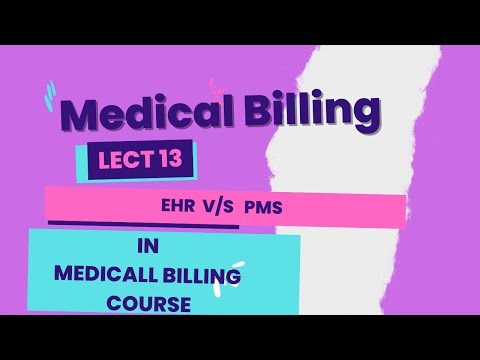
EHR vs. EMR Software Systems in medical Billing|| Lecture 13,medical billing software application, medical billing, medical software application, medical billing training, medical billing chance, medical billing from house, medical records, electronic medical records, american service systems, medical software application pointers, electronic medical record (software application category), ipad medical billing, medical billing services, medical record, electronic…
0 notes
Text
Valant EHR vs. Care360 EMR: Telling Them Apart
Understanding the differences among EHR platforms is necessary to make the right decision. You need to know that all healthcare solutions have certain specifics, and not every solution is a compatible match for your practice. If a certain practitioner has incorporated a multi-specialty solution, it doesn’t mean you have to do the same. Don’t be a fool following the crowd. Instead, learn what you…
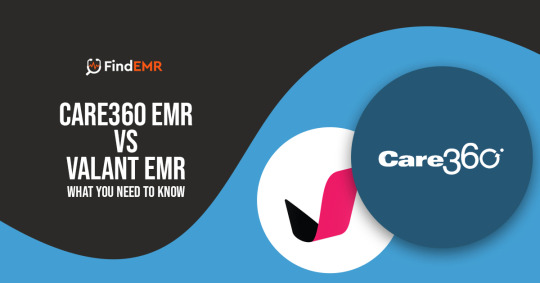
View On WordPress
0 notes
Text

Electronic Medical Record Systems will first incorporate big data and analytics and use artificial intelligence. These tools will enable doctors to find patterns and conclusions with health sector data. For instance, they can perhaps forecast future health problems that may be fatal once they have developed, but with early diagnosis, they can be treated depending on overall health requirements.
0 notes
Text
EHR vs EMR: Differences between the two and Which one is right for you?
Electronic Health Record Versus Electronic Medical Record. Are you confused about the difference between electronic health records (EHRs) and electronic medical records (EMRs)? While these two terms are often used interchangeably, they are not the same thing. Understanding the differences between EHRs and EMRs is important for patients, healthcare providers, and medical professionals…

View On WordPress
0 notes
Text
Stop Struggling: Solve the EMR vs EHR Confusion Now!
The first step in comprehending EMR vs EHR is knowing what each of them stands for;
1-EHR stands for electronic health records
2-EMR stands for electronic medical records.

1 note
·
View note
Photo
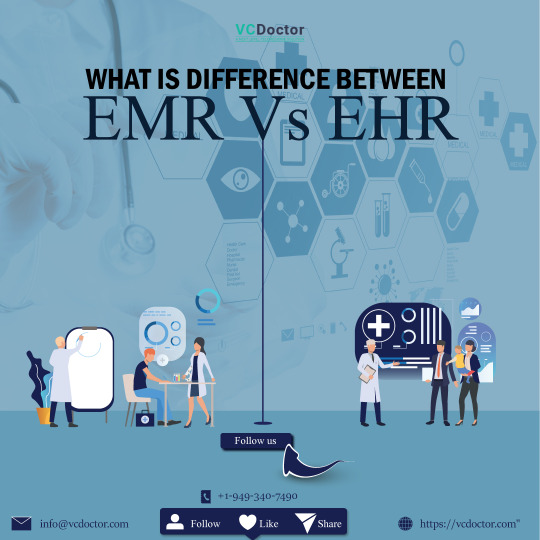
EMR vs. EHR are widely used terms. The concept of EHR is now more frequently observed. This is because the authorities like Centers for Medicare & Medicaid Services (CMS), and the Office of the National Coordinator for Health Information (ONC) utilizes these terms more promptly.
When we express the term “Medical Reports” it means some sort of clinical data documentation of diagnosis and treatment. But when we express the term “Health Records” it means we are speaking of health and medical conditions.
#difference between emr and ehr#emr vs. ehr#the difference between ehr and emr#emr vs ehr#emr ehr difference#emr meaning#telemedicine#what is telehealth#telehealth app#telehealth services
0 notes
Text
Global Trends, Key Industry Drivers, Barriers, Challenges, and Technologies in the Dermatology EMR Software Market 2021
Global Trends, Key Industry Drivers, Barriers, Challenges, and Technologies in the Dermatology EMR Software Market 2021
Electronic Medical Records (EMRs) are a subset of Electronic Health Records (EHRs) (EHR). Because chronic illnesses need lengthy follow-up periods in order to be cured, dermatology outpatients have a high number of chronic disease patients. As a result, dermatology EMRs will be useful in capturing dermatological data. EMRs in dermatology also provide for rapid, one-click retrieval of historical…

View On WordPress
0 notes
Text
Choosing the Right EHR/EMR: Cerner vs. Epic
When it comes to integrating an EHR/EMR system, the choice between Cerner and Epic can be pivotal for your healthcare practice. Both platforms offer robust features, but the best fit depends on your specific needs:
Cerner is renowned for its strong multi-entity management and interoperability, making it ideal for networks with multiple facilities.
Epic, on the other hand, is praised for its comprehensive features and user-friendly interface, perfect for larger healthcare systems focused on patient engagement and continuity of care.
Consider your organization's size, specialty, and specific health IT needs before deciding. Need more insights? Let's discuss the best option for seamless integration and optimal healthcare delivery!
#HealthcareIT #EHR #EMR #Cerner #Epic #MedicalSoftware #HealthTech
0 notes